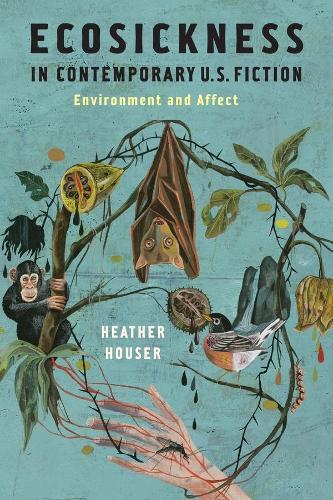Full Product Details
Author: Heather Houser
Publisher: Columbia University Press
Imprint: Columbia University Press
Dimensions:
Width: 15.20cm
, Height: 2.50cm
, Length: 22.90cm
Weight: 0.567kg
ISBN: 9780231165143
ISBN 10: 0231165145
Pages: 328
Publication Date: 03 June 2014
Audience:
Professional and scholarly
,
Professional & Vocational
Format: Hardback
Publisher's Status: Active
Availability: Manufactured on demand

We will order this item for you from a manufactured on demand supplier.
Language: English
Reviews
This sophisticated reconnaissance of an impressive range of turn-of-the-twenty-first-century works both adroitly builds upon and convincingly takes issue with the new 'materialist' ecocriticism by offering a subtly compelling assessment of the place of affect in works of environmental imagination and environmental intervention generally. Not contemporary U.S. fiction specialists alone, but ecocritics in all bailiwicks are sure to profit from Heather Houser's insights. -- Lawrence Buell, Harvard University The 'ecosickness' that Heather Houser explores offers yet another example of the dangers of humanity's efforts to 'master' nature. The novels and memoirs she studies demonstrate the intricate connections between somatic and ecological damage. Yet it is the literary critical argument that most distinguishes this work. Houser elegantly shows how these novels and memoirs produce narratives with unpredictable affects and how that unpredictability in turn generates an ethics that, she argues, might lead to new ways of addressing ecological damage. This timely book is crucial not only for its ecocritical insights, but for its depiction of the importance of humanistic inquiry to planetary ethics. -- Priscilla Wald, Duke University, author of Contagious: Cultures, Carriers, and the Outbreak Narrative
This sophisticated reconnaissance of an impressive range of turn-of-the-twenty-first-century works both adroitly builds upon and convincingly takes issue with the new 'materialist' ecocriticism by offering a subtly compelling assessment of the place of affect in works of environmental imagination and environmental intervention generally. Not contemporary U.S. fiction specialists alone, but ecocritics in all bailiwicks are sure to profit from Heather Houser's insights. -- Lawrence Buell, Harvard University The 'ecosickness' that Heather Houser explores offers yet another example of the dangers of humanity's efforts to 'master' nature. The novels and memoirs she studies demonstrate the intricate connections between somatic and ecological damage. Yet it is the literary critical argument that most distinguishes this work. Houser elegantly shows how these novels and memoirs produce narratives with unpredictable affects and how that unpredictability in turn generates an ethics that, she argues, might lead to new ways of addressing ecological damage. This timely book is crucial not only for its ecocritical insights, but for its depiction of the importance of humanistic inquiry to planetary ethics. -- Priscilla Wald, Duke University, author of Contagious: Cultures, Carriers, and the Outbreak Narrative In its analytical poise and sharp close readings, Ecosickness in Contemporary US Fiction itself is a valuable addition to affect studies and ecocriticism. 49th Parallel Vol 34, Autumn 2014 This well-researched argument draws on psychology, sociology, cognitive science, and other disciplines to illuminate the contributions artists make in conversations--typically dominated by scientists, environmentalists, and politicians--about environmental policy, and aims to encourage and enrich those conversations. CHOICE 11/1/14
This sophisticated reconnaissance of an impressive range of turn-of-the-twenty-first century works both adroitly builds upon and convincingly takes issue with the new materialist ecocriticism by offering a subtly compelling assessment of the place of affect in works of environmental imagination and in environmental intervention generally. Not contemporary U. S. fiction specialists alone, but ecocritics in all bailiwicks are sure to profit from Professor Houser's insights. -- Lawrence Buell, Harvard University The ecosickness that Heather Houser explores in Ecosickness in Contemporary U.S. Fiction offers yet another example of the dangers of humanity's efforts to master nature. The novels and memoirs she studies demonstrate the intricate connections between somatic and ecological damage. But it is the literary critical argument that most distinguishes this work. Houser elegantly shows how these novels and memoirs produce narratives with unpredictable affects and how that unpredictability in turn generates an ethics that, she argues, might lead to new ways of addressing ecological damage. This timely book is crucial not only for its ecocritical insights, but for its depiction of the importance of humanistic inquiry to planetary ethics. -- Priscilla Wald, Duke University, author of Contagious: Cultures, Carriers, and the Outbreak Narrative
This sophisticated reconnaissance of an impressive range of turn-of-the-twenty-first century works both adroitly builds upon and convincingly takes issue with the new materialist ecocriticism by offering a subtly compelling assessment of the place of affect in works of environmental imagination and in environmental intervention generally. Not contemporary U. S. fiction specialists alone, but ecocritics in all bailiwicks are sure to profit from Professor Houser's insights. -- Lawrence Buell, Harvard University
Author Information
Heather Houser is associate professor of English at the University of Texas at Austin.




